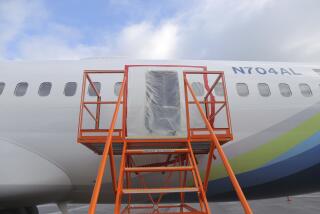Airline Will Admit Pilot Negligence in Crash
- Share via
To limit its costs in two dozen lawsuits, Southwest Airlines is willing to concede that pilot negligence caused a 737 passenger jet last year to crash through a Burbank Airport fence and skid onto a street, according to the airline’s attorney.
But the lawyer, Christopher M. Young, denies new allegations by two of the plaintiffs that the pilots landed under dangerous conditions to keep Southwest flights on a tight schedule. He also dismisses accusations by the same plaintiffs that the pilots were reluctant to take alcohol and drug tests immediately after the March 5, 2000, crash.
Young said Southwest’s offer to stipulate to its negligence should reduce the amount of time and money spent on litigation by resolving a key issue--responsibility for the crash.
To win damages, plaintiffs who accept the stipulation will have to prove only that they were injured in the crash.
“It’s best for us to do the right thing,” Young said. “If they are legitimate claims, we are more than happy to resolve them.”
About half of the plane’s 137 passengers filed claims against the airline, Young said. All but two dozen were resolved without lawsuits being filed.
Some of the suits have been settled for confidential amounts or are in settlement negotiations, Young said. A January trial is scheduled in Los Angeles federal court for suits that are not settled.
The allegations involving the alcohol and drug tests and landing conditions were lodged by Linda McDonnell and her daughter, Alana, who were in a Ford Taurus that the Boeing jetliner grazed as it skidded onto Hollywood Way. The McDonnells amended their suit with the accusations after U.S. District Judge Ronald S.W. Lew ruled in August that they could seek punitive damages.
Most of the lawsuits pending against Southwest seek compensatory damages for such costs as medical and psychological treatment. Because of Lew’s ruling, more of the plaintiffs are expected to ask for punitive awards, which can be far more expensive for the carrier.
6 Were Hospitalized After Burbank Crash
Southwest Flight 1455 from Las Vegas slammed through the metal air-blast barriers and fence at the end of the runway. It skidded to a stop a few feet from a gas station. That night, 15 of the 142 passengers and crew members complained of slight injuries. Capt. Howard Peterson, another crew member and four passengers were briefly hospitalized.
Peterson was the most seriously injured, with cuts to his scalp.
The McDonnells were not hospitalized, but Linda McDonnell suffers from hip and head injuries and post-traumatic stress syndrome, her lawyer, Richard C. Binder, said. Her daughter, then 4, also was traumatized. “She has a problem driving in cars,” Binder said of the daughter. She is afraid of driving near tall buildings because she fears they might crash down on her, he said.
Binder said a recent National Transportation Safety Board report indicates that the plane landed too fast and too far down the runway. McDonnell’s suit alleges that Southwest pressures pilots to make risky landings at Burbank to avoid delays and get planes back into the air within 20 minutes.
“Southwest prides itself on punctuality but punctuality at what expense?” Binder asked. But Young denied that the airline encourages pilots to take risks to achieve quick “turnarounds.” “There is absolutely no policy which would state explicitly or implicitly [that] a pilot should choose speed over safety,” he said.
To win punitive damages from the airline, the plaintiffs must prove that Southwest acted maliciously, Young said. “There is no evidence,” he added.
Suit Says Cockpit Crew Refused Drug Tests
In the seconds before the crash, Peterson could be heard on the flight recorder saying, “My fault . . . my fault.” Then, he declared, “Well, there goes my career.”
According to the McDonnells’ amended suit, Burbank Police Sgt. Richard Madrid asked Peterson and 1st Officer Jeffrey D. Erwin to take alcohol and drug tests at Providence St. Joseph Medical Center in Burbank, but they refused.
Another pilot, Capt. Jon Weaks, who identified himself to authorities as a Southwest representative, told Madrid that Peterson was allowed to wait eight hours before taking the test, which was not true, the suit contends.
Young and attorney Arthur I. Willner, who represents the pilots, disputed Binder’s account of the events at the hospital.
Willner said an emergency room physician offered to do the tests, but the pilots declined because the airline has its own procedures for drug screening after a crash. He said the Federal Aviation Administration and NTSB were satisfied with Southwest’s handling of the drug screenings. Any suggestion that the pilots were under the influence of alcohol or drugs is outrageous, he added.
“They are being tarred because they wanted to wait for [a drug-testing] outfit they knew would do it right,” Willner said. The attorney noted that Madrid testified in a deposition that he did not detect any signs of intoxication from Peterson and Erwin.
A few months after the crash, Southwest fired Peterson and Erwin. Erwin was reinstated after his union filed a grievance. He has been flying since January, Willner said. Peterson, a former Air Force pilot who joined Southwest in 1988, also had his firing overturned and was allowed to retire.
More to Read
Inside the business of entertainment
The Wide Shot brings you news, analysis and insights on everything from streaming wars to production — and what it all means for the future.
You may occasionally receive promotional content from the Los Angeles Times.










